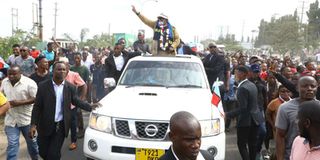Amnesty says Tanzania repressing opponents as election looms

Chadema presidential candidate Tundu Lissu during a past campaign.
What you need to know:
- Tanzania's campaign will play out amid uncertainty over how the country is faring in its fight against the coronavirus.
- The government has not released figures on infections since late April.
- Voters will also select new MPs and ward councillors when they go to the polls on October 28.
Rights watchdog Amnesty International says Tanzania has ramped up repression against political opposition parties, independent media outlets and other groups, ahead of the October 28 elections.
And although authorities in Tanzania say they want only legal political activities conducted, the latest report by Amnesty International says the electioneering period has seen little room given to civil society groups critical of the government.
In a report titled ‘Lawfare: Repression by law ahead of Tanzania’s general election’, the watchdog accused President Magufuli of ‘weaponising’ the law against perceived opponents of the government.
“The use of the law to systemically and deliberately clamp down on people’s inalienable human rights, especially in an election season, is an extremely worrying and unhealthy sign for a country positioning itself for greater growth and development,” said Deprose Muchena, Amnesty International’s regional director for East and Central Africa.
According to the report the campaign period in Tanzania has witnessed the arbitrary arrest and detention of opposition politicians, police applying assembly laws in a selective and partisan way.
“Opposition activities continue to be severely restricted, while politicians from the ruling Chama cha Mapinduzi (CCM) party and public officials disregard the same law and operate freely.
New laws
Four laws have also been passed to restrict NGOs operations in Tanzania.
“From June 2019, NGOs were required to disclose the source of their funding, and from April 2020 additional guidelines were passed to give government more control over NGOs impeding freedom of association. Supervision of certain NGO functions that had previously been under the Ministry of Health, Community Development, Gender, Elderly and Children is now under the President’s Office, an indication of growing executive influence over NGO operations,” part of the report reads.
In June, human rights NGOs were banned from undertaking election-related activities while international observers were ordered not to speak about the elections.
Tanzania’s Elections Commission on June 23 barred key civil society organisations from conducting voter education.
These organizations include Tanzania Constitution Forum (TCF), the Legal and Human Rights Centre (LHRC), the Tanzania Human Rights Defenders Coalition (THRDC) and the Tanzania Episcopal Conference (TEC) from conducting voter education.
“President Magufuli must urgently reverse the decline in political and civil freedoms in Tanzania and ensure human rights defenders, activists, journalists and civil society organizations can carry out their work freely and independently without fear of reprisals,” Mr Muchena added.
“The UN and Tanzania’s development partners have been relatively muted on the human rights situation in Tanzania, and must increase their engagement, publicly and privately, at this critical juncture,” the report read.
The organisation says the East African Community should urge Tanzania, which is a member, to meet its rule of law and governance commitments.





